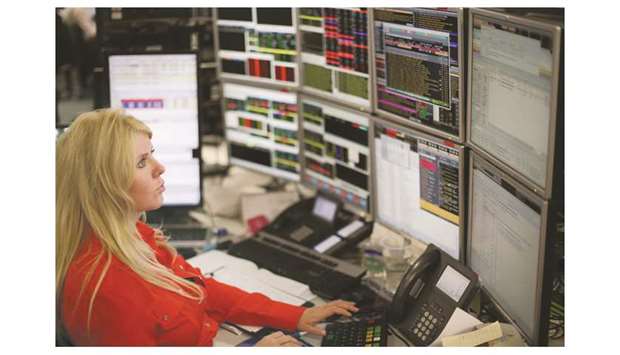The pound firmed against the dollar and euro yesterday as the European Union prepared to grant a further delay to Brexit, averting the prospect of Britain departing the bloc next week without a deal.
The prospect of another delay had initially hit sterling, which briefly dropped as low as $1.2841 yesterday in Asian trade before bouncing back to over $1.2890, up from late in New York on Tuesday.
The pound is experiencing volatility on every Brexit twist and turn.
Earlier this week the unit reached five-month highs above $1.30 on increasing hopes that a painful ‘no-deal’ Brexit divorce would be averted.
Prime Minister Boris Johnson told parliament that if it defeated him on the timetable and forced a delay until January he would abandon his attempt to get lawmakers to ratify the deal and instead seek an election before Christmas. That led investors to price in elections and another Brexit delay.
“The likelihood of a Brexit deal has risen, but crucially the outcome that investors feared the most, a no-deal Brexit that could have pulled sterling down to $1.12 - seems less likely now than at any time in the last few months,” said Mark Haefele, chief investment officer at UBS Global Wealth Management in a note to clients.
“We retain our overweight position in sterling versus the US dollar in our FX strategy.”
Haefele added that if the likelihood of a general election grows, sterling would settle in a $1.26-1.32 range, and if a deal for Britain to exit the European Union eventually passes, the pound would rally to $1.35.
Goldman Sachs said that it still expected the UK parliament to approve Britain’s Withdrawal Agreement with the EU, and that there would be a “technical extension” to Brexit of three or four weeks beyond the October 31 deadline.
EU leaders are considering Britain’s request for a Brexit delay, and are expected to grant a three-month extension to the Oct. 31 deadline for its departure.
By afternoon in London, sterling was 0.15% higher to the dollar at $1.2889 after falling 0.62% on Tuesday. It was 0.1% higher to the euro, last trading at 86.26 pence .
Two-week implied volatility on sterling – a contract that captures the October 31 deadline – continued to fall, indicating there is little fear of a no-deal Brexit around that date. It was trading around 9.3%, the lowest since October 10.
However, the renewed uncertainty, especially around possible elections, boosted British government bonds, pushing 10-year yields as much as 5 basis points lower to the lowest since October 16.
Nomura currency strategist Jordan Rochester sees the pound heading lower to around $1.27 on any election announcement.
“Like Brexit, the pound is bouncing around,” said CMC Markets UK analyst David Madden.
“Traders are terrified at the prospect of a no-deal Brexit, but that currently seems very unlikely, which is assisting the pound,” he added.
In stock market trading, London’s benchmark FTSE 100 index climbed 0.7% to 7,260.74 points, while Paris’s CAC 40 was down less than 0.1% at 5,653.44 and
Frankfurt’s DAX 30 gained 0.3% to 12,798.19 points at the close yesterday.
The EU is set to grant another Brexit extension after British MPs on Tuesday rejected Prime Minister Boris Johnson’s bid to force his divorce deal through parliament this week.
European Council president Donald Tusk has recommended that the EU’s 27 other member states grant an extension, likely until the end of January.
In the meantime, the UK could hold a general election aimed at ending the Brexit deadlock, according to analysts.
Elsewhere yesterday, Wall Street moved higher, with the Dow up 0.3% in midday trading.
Shanghai’s main stocks index closed down 0.4% and Hong Kong lost 0.8%, with traders keeping tabs on reactions to a Financial Times report saying China is drawing up a plan to remove Hong Kong’s beleaguered chief executive after nearly five months of pro-democracy unrest.
In commodities trading, oil prices bounced higher after data indicated US oil and gasoline stockpiles decreased, easing worries about weak crude demand growth as the world economy slows.
On the corporate front, shares in French carmaker PSA jumped 3.2% after the company said healthy demand for upmarket models helped it resist a slowdown in the global automotive market.
The maker of Peugeot, Citroen, DS, Opel and Vauxhall vehicles announced a one-percent gain in third-quarter sales to €15.6bn ($17.4bn).
Meanwhile shares in Boeing climbed 3% despite reporting that third-quarter profits fell by half to $1.2bn as it said it expects to get regulatory approval this year to return the grounded 737 MAX to service.
“Dow component Boeing’s profit miss is being shrugged off as the company stuck to its plan to return the 737 MAX to service” by the end of the fourth quarter, said analysts at Charles Schwab brokerage.

A trader is seen at the London Stock Exchange. The FTSE 100 index climbed 0.7% to 7,260.74 points yesterday.
